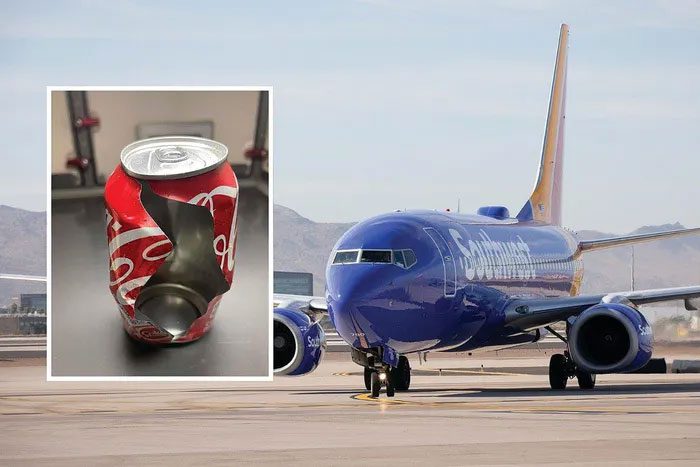In June alone, there were over 100 reports of exploding carbonated beverage cans on Southwest Airlines flights in the United States. This number could triple in July. What is the cause?
Dozens of Flight Attendants Injured
According to the New York Post, since the beginning of summer 2024, multiple cans of soda have exploded on Southwest Airlines flights, injuring over 20 flight attendants, with some requiring stitches for their wounds.

Southwest Airlines is implementing various measures to completely eliminate the issue of exploding beverage cans on flights.
Bill Bernal, President of the Southwest Airlines Flight Attendants Union, stated that incidents of exploding beverage cans have occurred for some time, but this year they have become more frequent than usual.
According to CNN, the problem of exploding soda cans is unique to Southwest Airlines as the airline does not serve perishable items, hence there is no requirement for refrigerated trucks or storage. As a result, under harsh weather conditions at certain airports in some of the hottest places in the U.S. such as Las Vegas, Phoenix, Houston, or Dallas, the soda cans are subjected to extreme temperatures.
In these conditions, according to Dr. Kate Biberdorf, a chemistry professor at the University of Texas, cans of carbonated beverages are akin to small bombs, capable of exploding with even minor impacts.
She explained that when a soda can is exposed to heat, the CO2 gas inside expands, creating significant internal pressure. Typically, soda cans are designed to withstand pressures of 3-5 times the normal atmospheric pressure.
However, when the pressure inside the can exceeds this level, or if there is a minor defect during production, the cans become prone to exploding. During the beverage service to passengers, if a flight attendant holds or opens a can that is at the pressure threshold, it can easily burst.
The expert added that the altitude of the aircraft does not impact the pressure inside the soda cans because the cabin pressure is regulated to match conditions at sea level. The issue of exploding cans does not only occur on airplanes but can happen with any carbonated can left in a car and exposed to high temperatures.
“In the summer, many people tend to leave soda cans in their cars. As soon as the car starts moving, various forces can cause the cans to collide inside the vehicle, leading to explosions,” Dr. Biberdorf remarked.
Airline Responds
According to CNN, the largest low-cost airline in the U.S., Southwest Airlines, has confirmed that the incidents have occurred on its flights.

Deformed soda cans exploding on airplanes.
“We are aware of this issue. For the safety of our customers and staff, we have implemented measures to keep beverages cooler on our flights, especially at airports with extreme temperatures. We are also minimizing any dangers related to heat,” a Southwest Airlines spokesperson stated.
The airline affirmed that prior to the summer season, they communicated with crew members and emphasized that no passengers had been affected or injured due to the exploding soda cans.
Currently, the company is testing refrigerated cargo trucks in Phoenix and Las Vegas. The service teams are also required to use electronic thermometers to check the temperature of the cans before boarding. Cans above 98 degrees Fahrenheit (approximately 37 degrees Celsius) will not be taken onboard.
The company has also issued guidelines for flight attendants. The guidelines state that attendants should only take drink orders from passengers, prepare, and serve the drinks without pushing beverage carts down the aisle or opening deformed or unusually warm cans. “The immediate and long-term measures mentioned above aim to completely eliminate the issue of exploding carbonated cans at Southwest Airlines,” Mr. Bernal confirmed.
Southwest Airlines Co. is a major American airline headquartered in Dallas, Texas, and is the largest low-cost airline in the world, operating approximately 4,200 flights daily. The Southwest spokesperson did not provide specific details about the injuries sustained by flight attendants. Currently, no passengers have been reported injured. |


















































